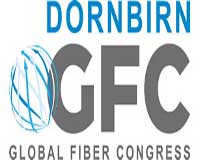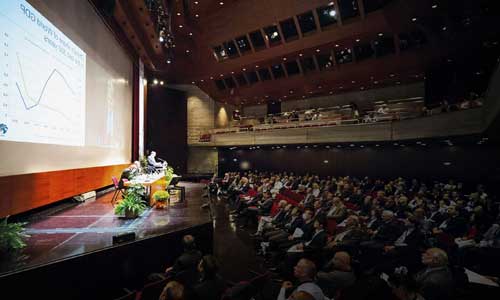"The recently concluded 56th Dornbirn Man-Made Fibers Congress highlighted innovation is key for the industry and all producers have to work together in partnership along the whole supply chain in a world that is becoming increasingly digital and driven by the ‘millennial’ generation of consumers. The message was loud and clear to push European textile manufacturing ahead and not restrict itself by negative reports. The event hosted more than 100 lectures having the best concoction of industry and academic research."

The recently concluded 56th Dornbirn Man-Made Fibers Congress highlighted innovation is key for the industry and all producers have to work together in partnership along the whole supply chain in a world that is becoming increasingly digital and driven by the ‘millennial’ generation of consumers. The message was loud and clear to push European textile manufacturing ahead and not restrict itself by negative reports. The event hosted more than 100 lectures having the best concoction of industry and academic research. The key themes included fibre innovations, and fibres, textiles and nonwovens for healthcare and hygiene, protective applications, and sports and leisure wear. It attracted more than 700 participants from over 30 countries, including a 30-strong delegation from China. The three-day event also included several panel discussions and a young scientists’ forum, as well as a recycling workshop.
Aiming towards productivity

In his opening remarks, Robert van de Kerkhof, Chief Commercial Officer, Lenzing and President, Austrian Fibers Institute, noted the global fibre market is growing by 3-4 per cent a year, with the highest growth in Asia, especially China. Further, the technical textiles market is predicted to reach 42 million tonne by 2020, where functionality is being applied to a range of new applications, such as architecture, automotive and sportswear. But there is a dark side to the industry: after petroleum, the fashion industry is one of the world’s most polluting industrial sectors. According to Changing Markets Foundation, the manufacture of viscose, for instance, could be sustainable, but is often not, owing to its prevalent production methods. Kerkhof said, leaders have to raise the bar, state priorities, and show the brands and retailers that it is possible to produce fibres responsibly and sustainably.
Delusions and rectifications
Heinz Meierkord, President, CIRFS, the European Man-made Fibres Association, and CEO, Advansa, noted manmade fibres accounted for 68 per cent of global fiber production in 2016, followed by cotton with 24 per cent. Further, manmade fibers are more durable than natural fibers, the shelf life of synthetic fabrics is longer, washing can take place at lower temperatures, and they dry quickly, without the need for ironing. In many industrial applications, manmade fibers can also provide properties of light weight, high strength and protection from weather, as well as being used in geotextiles, medical textiles and filtration.
Awarding excellence
Paul Schlack/Wilhelm Albrecht Prize 2017 was awarded to two researchers working on the development of polyethylene-based carbon fibres as part of their doctorates at the Institut für Textiltechnik (ITA) at RWTH Aachen, Germany. Gisa Wortberg focussed on the development of polyethylene-based carbon fibres for thermochemical stabilisation, while Andreas De Palmenaer worked on the conversion of the polyethylene-based precursors. The researchers demonstrated the technical feasibility of using polyethylene as an alternative precursor material for carbon fibre, as well as the ability to control the process chain and its economic potential. Meanwhile, the Paul Schlack Honorary Prize 2017 was awarded to ITA’s Markus Beckers for the development and analysis of a new manufacturing process for polymer optical fibers.
Sustainable Routes
A recycling workshop was held a day prior to the congress. This was chaired by Syngroup Management Consulting of Austria, and focussed on the ‘Circular Economy: Textile and Nonwovens Waste – a threat or opportunity?’ Ikea and adidas were among some of the brands present during the workshop. It was jointly organized by Dornbirn-MFC in cooperation with CIRFS, EDANA (the international association serving the nonwovens and related industries) and the International Solid Waste Association.
In a panel discussion moderated by Giuseppe Gherzi, of Gherzi Consulting, Switzerland, on sustainability and performance in the sports and leisure wear industry, the key message was brands/retailers should work with the entire value chain. However, the question remains as to who should drive sustainability. Ranil Vitarana of MAS Holding, Sri Lanka, noted that the textile industry is extremely fragmented, but sustainability should be driven by Europe. However, there needs to be a cohesive plan to implement it faster.
Next edition of the newly rebranded 57th Global Fiber Congress Dornbirn will be held on September 12-14, 2018. The main topics, include : fibre innovations; transport and mobility; recycling; energy storage; surface modification and additives; and additive technologies.












